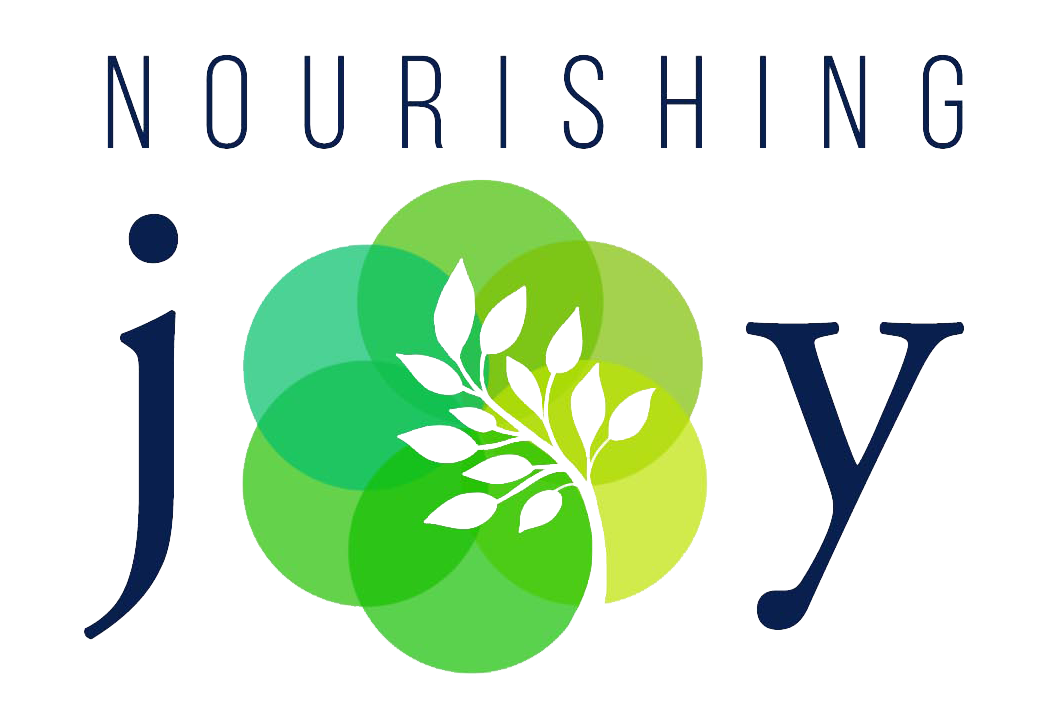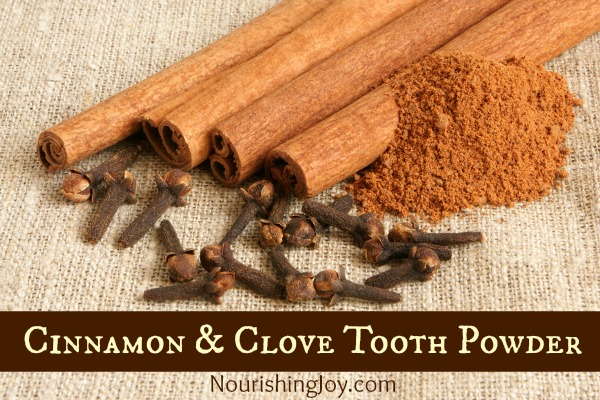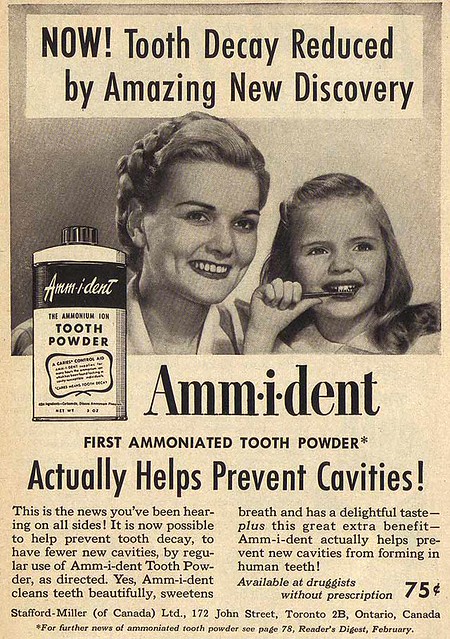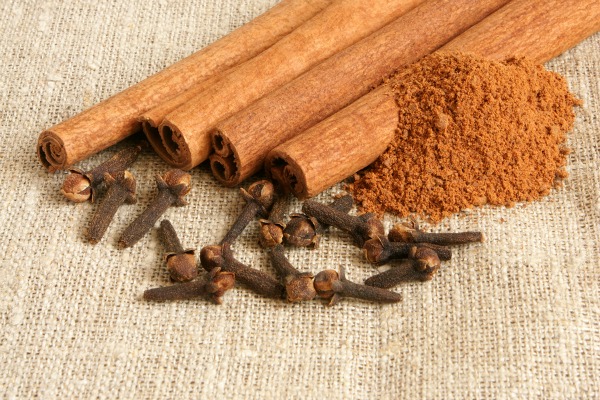Cinnamon & Clove Tooth Powder
This post may contain affiliate links, including those from Amazon.com, which means we earn a small commission off your purchases. And here's the thing: We only mention services and products that we think are truly worth your attention, whether they're free, paid, or otherwise. This site relies on YOUR trust, so if we don't stand behind a product 110%, it's not mentioned. Period.
Okay. Let's get one thing straight.
I used to think tooth powder was weird.
In hindsight, I don't know why, as it's even been in recent history where tooth powder has been the norm:
But nonetheless, like much of the Western world, I've gotten used to squeezeable toothpaste that presses easily out of a tube and foams in my mouth.
After reading about a cleaning technique called “The Secret” by Dr. Ray Behm, however, and after seeing more and more recipes for tooth powder around the natural living community in the last couple of years, I decided to give it a try.
And let me say, y'all, that I really, really like it. I don't know why it took me so long to try something new!
So, of course I want to share it with you all.
Also, since our regular homemade toothpaste recipe is one of the most popular posts on this site, I figured you, like me, want to find the best way to take care of your teeth naturally. And not only that, but Ramel Nagel in his popular book, Cure Tooth Decay, promotes tooth powders as effective ways to remineralize teeth, so this tooth powder is both natural and an excellent way to promote long-term dental health.
So I urge you, give this a try! This is an amalgam (ha! pun intended) of the recipes at Wellness Mama, Crunchy Betty, and the aforementioned “Secret.”
************************************************************************
UPDATE: Due to an overwhelming number of e-mails requesting brand recommendations, here are a few brands I use. These are all Amazon links so that you don't have to pay for shipping at multiple sites, and yes, they are affiliate links, so if you purchase your products through these links, I will receive a small commission. As always, thank you!
By no means are these the only brands that are good or reputable, they are merely the ones I tend to use, so feel free to get them at your local natural foods store or at other retailers online that you trust.
Bentonite Clay | Calcium Powder or Calcium-Magnesium Powder
Activated Charcoal (these are in capsules, which are easy to pull apart)
Sea Salt | Fair-Trade Cinnamon
Cinnamon & Clove Tooth Powder
makes approximately 2/3 cups, which lasts our family about 1 month
4 tablespoons bentonite clay
4 tablespoons calcium powder (if you're making your own, make sure it's ground extra-fine)
1 teaspoon baking soda (omit if the mixture is too salty for your taste or if you have metal braces)
1 tablespoon fine sea salt
1 tablespoon cinnamon
1 teaspoon cloves
1 tablespoon activated charcoal (optional)
Mix all ingredients together well and store in an airtight container (or individual containers, if you prefer).
To use, scoop up a mounded heap of the tooth powder with a dry toothbrush, then place in the mouth without wetting the brush. Your saliva will quickly provide more than enough moisture. As you brush, pay extra attention to getting the mixture into the space between your teeth and your gums as well as the usual scrubbing on both the front and back of each tooth.
Brush lightly, as there's plenty enough abrasiveness with the salt, baking soda, and clay to clean well without heavy-handed scrubbing. If I scrub too hard, I find my gums feel a little beat-up….
Spit or swallow as desired, then rinse with water.
Don't want to make your own? Primal Life Organics has an absolutely gorgeous tooth powder – available in multiple flavors and with or without charcoal – so just click here to buy tooth powder rather than gather supplies and make your own.
The Ingredients
Calcium is an essential mineral for proper and healthy body function. By ingesting it, we ensure adequate amounts are available for proper body function. By using it in toothpaste and tooth powder, it is a mild-but-effective abrasive.
Bentonite clay is an edible clay that is not only chock full of essential minerals our bodies crave, but it helps rid our bodies of toxins. In toothpaste, it also functions as a gentle abrasive and cleanser. Interestingly, it's also alkaline, which is important in toothpaste and tooth powder. As bacteria grow through the day by feeding on the sugars of food debris in your mouth, their wastes create an acidic environment, which eat away at tooth enamel, create halitosis, and can enflame gums. The alkalinity of the clay balances that that acid, which slows the effects of the acid.
Unrefined sea salt & baking soda are both gentle abrasives. (If you’re worried they might be too abrasive, check out their RDA values here.) More than that, however, they are crucial for neutralizing the acids around your teeth. The salt and baking soda do the very important job of neutralizing acids and making your mouth an inhospitable place for those acid-creating bacteria.
Cinnamon & cloves are spices that not only make the tooth powder taste so very refreshing, but are known for their their antibacterial properties. Obviously, the ground versions here are not nearly as potent as the essential oils that are derived from the same spices, but they act similarly, even on a lesser scale. If you'd like, you may also add a bit of five-spice powder for flavor or a tiny pinch of cayenne pepper for a bit of pain numbing if you've got extra-sensitive gums.
Activated charcoal, like clay, draws toxins out of the body and in this usage, acts as a natural tooth whitener. Thus, it's great in homemade tooth powder because it helps create an inhospitable environment for bacteria, draws out any toxins in the mouth, freshens breath, and whitens teeth.









Oh man! I just made our homemade toothpaste a few days ago. Wish I had waited. I’ll pin this for when we run out. It sounds delicious, and I have all the ingredients here at the house. Thanks!
Where can you buy bentonite clay and is the calcium just finely ground calcium tablets?
You can find bentonite clay at Amazon.com, at your local natural food store, at Redmond Trading company online, at Mountain Rose Herbs online, or numerous other sources.
The calcium can be made at home from eggshells or you can find it as “calcium carbonate” or “coral calcium” at your local natural health food store.
Is bentonite clay a must ingredient? What else could I use that is more an everyday material?
Thanks for the helpful info!
No, you can get by without the clay, although I highly recommend using it. In that case, just use an equal amount of calcium powder in its place.
I hope that helps! 🙂
Just saw the link on the eggshell calcium…thanks
This sounds great. Can I make it without the calcium? It’s not something I have on hand…
Absolutely. I would substitute more clay, though, just to keep the ratios similar so that the flavor of the cinnamon and cloves isn’t overwhelming. 🙂
Would you recommend brands for bentonite clay, activated charcoal, calcium, and the sea salt you use? Thank you!
Sure. Here are some of the brands I use – I’ve updated the post above to include links. There are other many reputable brands as well, so be sure to check Mountain Rose Herbs or your local natural food store for other options.
I use Redmond Clay for the bentonite clay.
I use Source Naturals for the activated charcoal.
I use Now Foods or Organika for the calcium powder.
I use Celtic Sea Salt for the sea salt.
Again, there are certainly other excellent brands. Use what you love.
Thank you for this value information… and I am take this link wait for send it to her when she move to Oregon from New Mexico, I am here in Texas, so She (Sandra) had pain in her gum (MS) and her doctor recommence was not help her much…
I thought it will help her an old fashion and natural remedies, Wink!
Oh man! Now this is exciting! I have everything BUT the bentonite in powder form. I do have it in the liquid suspension. Do you think I could get away with using that and making a liquid-ish toothpaste? Perhaps in a smaller quantity to reduce chances of it spoiling? Although, given the fact that the suspension is already shelf-stable, and all of the things I would be adding would likely only reduce chances of spoilage…. perhaps it would be fine? I may try it for kicks, before investing in powdered bentonite. Hmmmm…
Definitely try it! I would think it would work just fine – you’d just have tooth PASTE instead of tooth POWDER. 🙂
wish you had a pin button! I love pinterest!
We’re working on it! 🙂
In the meantime, do you have the Pinterest bookmarklet? You can pin anything from any page! 🙂 http://about.pinterest.com/goodies/
Does it stain or react with crowns and such when used. Sound great but wondering what it would do to them, has anyone tried it?
Ha, I like the addition of the old adverts. Thanks for the recipe and brand links. I need to incorporate the calcium, something I have yet to do.
Other than that, I make something similar to this, but in paste-like form, by mixing in unrefined, organic, cold pressed coconut oil to hold it all together. Seeking the best possible formulation, I have wondered if there is additional benefit to making it “powder” only, or if it just comes down to personal preference. What are your thoughts?
One thing I have learned when using powdered herbs, is that even though the herb is already in powdered form, taking a moment with a mortar and pestle will help mix it together more thoroughly and break down any larger particles that might otherwise get stuck between teeth or gum line. Having had a batch made with powdered cloves, I was disheartened to pull bits out even after a thorough floss and rinse.
Yes, our homemade toothpaste is similar – basically these ingredients plus coconut oil. https://nourishingjoy.com/cinnamon-nutmeg-toothpaste/ As for benefits, I think it comes to preference. Coconut oil is certainly good for teeth and oral health, but when traveling, powder can be nice. So, it’s definitely up to the brusher! 🙂
A mortar and pestle is a great idea! I haven’t had the same experience with the ground cloves, but I’m sure each brand/batch can differ, so it’s a great idea.
Thanks so much for this recipe! Do you think it would be okay to use calcium citrate rather than carbonate? My naturopath has said citrate more absorbent as an oral supplement . Perhaps in toothpaste it wouldn’t matter?
From a supplemental standpoint, definitely go with whatever your naturopath has advised you – I agree it’s an excellent dietary supplement.
However, from a dental hygiene standpoint, calcium citrate is an acid, whereas calcium carbonate is a chalk-like powder and is a base. Since part of a tooth cleaner’s role is to neutralize the acids that eat away at a tooth’s enamel, calcium carbonate – or other basic powder – is a better choice. I would avoid calcium citrate as a dentifrice if possible.
Just recently I made a similar recipe for homemade toothpaste using clay. After a couple of months our sink drain got plugged up and after taking it apart it looked as though remnants of the toothpaste was the cause! Any suggestions?
Oh, interesting! I haven’t experienced that.
But we certainly have experienced clogs and the method of cleaning drains in this Crunchy Betty article has worked really well for us on numerous occasions. It has also helped to have a small plunger to fit over the top of the drain to push water through.
http://www.crunchybetty.com/clean-your-drains-with-baking-soda-and-vinegar-surprise
Good luck!
Any thoughts on using French Green Clay instead of Bentonite? It’s what I have on hand, and Mountain Rose Herb’s descriptions of both makes them seem very similar.. Thanks!
Well, from what I understand, French Green Clay doesn’t absorb the same way that bentonite does, so while it would work well as a scrubbing agent, it wouldn’t have the same effect on bacteria and leaching toxins from your gums and tongue (not that you get much detoxing from just a couple minutes of brushing, but there is some effect).
Also, I would verify that the source/brand you have is suitable for ingestion. Some clays are better left outside the body – French Green can go either way, so verify your source first!
Other than that, I’m always a fan of using what you have on hand, so as long as you have a chemical-free, suitable-for-internal-use clay – go for it! 🙂
Excellent points! I’m headed to the cabinet to check on the internal usage of my clay right now. Thank you for the quick response!
Seems a great recipe! Will definitely try it out. Just one question: Don’t regular use of baking soda wears down tooth enamel?
If you’ve got very weak enamel, perhaps, so if that’s the case, try using the tooth powder just 2-3 times a week. But there’s a link to the RDA (Relative Dentin Abrasivity) value of baking soda in the article – I forget the exact number, but baking soda ranks far lower for abrasiveness than most commercial toothpastes on the market.
I hope that helps! 🙂
Thanks alot Kresha, for you reply. My friend who used a homemade tooth powder based on baking soda for years now complains of damaged tooth enamel, that is why I was worried. I understand the value of baking soda but I would’nt use it more than 2 times a week. Also I use a natural toothpaste for regular use, bought from my health store and avoid those that contain abrasives.
You’re so welcome. Yes, that sounds wise.
One quick note, though – all toothpastes contain an abrasive of some sort, so check out that RDA chart to find one with as few abrasives as possible. They range from Peelu, which uses actual tree fibres to do that job, to Colgate and other brand names that create and patent their own abrasives. I’d love to hear which storebought toothpaste you decide to use!
Sorry Kresha for late reply. I use Spry toothpaste and also the homemade powder in between. Let me know your views on Spry.
Kresha, you commented ” Since part of a tooth cleaner’s role is to neutralize the acids that eat away at a tooth’s enamel, calcium carbonate – or other basic powder – is a better choice. I would avoid calcium citrate as a dentifrice if possible”, but your link for calcium-magnesium power goes to the citrate version??
Hmmm…. interesting. I was unaware of that. So, thank you. And it reminded me that since the time since I wrote this article, I have found a new calcium-magnesium powder to recommend, so I’ve updated the link to a different (non citrate!) product.
Thank you – I really appreciate you pointing that out!
Thinking about trying this recipe, but had a question on the activated charcoal. I have porcelain veneers and am worried the charcoal might scratch the exteriors. Thoughts? I realize it is optional, but have heard that charcoal provides lots of benefits so wondering if I should try it!
Oh, goodness, I have no idea. I’m sorry! Perhaps try contacting Dr. Behm’s staff (he’s the dentist listed above) or ask the Revaks at OraWellness. Here’s a link to Dr. Behm’s site: http://behmnaturaldentistry.com/natural-dentistry-resources/steps-to-save-your-teeth-now/ and you can find OraWellness at http://www.orawellness.com.
Otherwise, perhaps search for a mercury-free dentist in your area to call.
Good luck! 🙂
I tried this and it totally worked! I was never a fan of toothpaste and now I don’t have to deal with it anymore! Thanks!
Hi, do you have any information that this paste can help healying tooth cavity?
Unfortunately, I don’t have any specific information about healing cavities outside of the scope of what I’ve included in the article. 🙁
Can you use Calcium Magnesium + Vitamin D Pills and grind them up? also, it is safe for kids?
Yes! As long as you don’t use the kinds that fizz, such as Calcium Citrate. And yes – this is safe for kids, although you might want to go a little bit light on the cinnamon, as it is spicy. 🙂
Wondering if it’s safe for my son to use this recipe with his braces? Thanks
As long as it doesn’t cause him pain when brushing (which may depend how much his teeth are moving and on what kind of metal are in his brackets) and he’s able to rinse it all out after brushing, it should be fine!
(But remember, I’m not an orthodontist, so if you notice any issues at all, be sure to ask your child’s care provider!)
Do you find that this stains your teeth? My toothbrush is stained after 1 week of use, so I just want to make sure there won’t be tooth staining with long term use.
It definitely can stain the toothbrush because the bristles are very soft, but long-term, it’s a whitener for enamel, especially if you include the activated charcoal, which is one of the worst toothbrush-stainers. 🙂